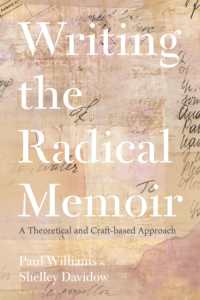- ホーム
- > 洋書
- > 英文書
- > Politics / International Relations
Full Description
The essays in this volume portray the debates concerning freedom of speech in eighteenth-century France and Britain as
well as in Austria, Denmark, Russia, and Spain and its American territories. Representing the views of both moderate and radical
eighteenth-century thinkers, these essays by eminent scholars discover that twenty-fi rst-century controversies regarding the extent of permissible speech have their origins in the eighteenth century. The economic integration of Europe and its offshoots over the past three centuries into a distinctive cultural product, "the West," has given rise to a triumphant Enlightenment narrative of universalism and tolerance that masks these divisions and the disparate national contributions to freedom of speech and other liberal rights.
Contents
1 Introduction: Freedom of Speech: Contemporary Issues and a History 2 Libertas Philosphandi in the Eighteenth Century: Radical Enlightenment versus Moderate Enlightenment (1750-1776) 3 In Praise of Moderate Enlightenment: A Taxonomy of Arguments in Favor of Freedom of Expression 4 Cynicism as an Ideology Behind Freedom of Expression in Denmark-Norway 5 Alexander Radishchev's Journey from St. Petersburg to Moscow and the Limits of Freedom of Speech in the Reign of Catherine the Great 6 Print versus Speech: Censoring the Stage in Eighteenth-Century Vienna 7 The Crisis of the Hispanic World: Tolerance and the Limits of Freedom of Expression in a Catholic Society 8 Rousseau, Constant, and the Emergence of the Modern Notion of Free Speech 9 Toward an Archaeology of the First Amendment's Free Speech Protections 10 Conclusion: A Way Forward?








